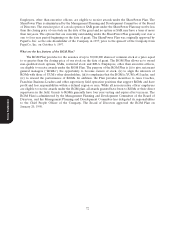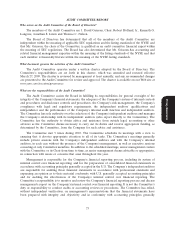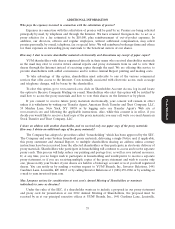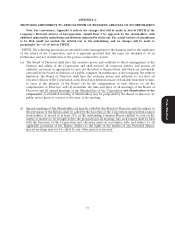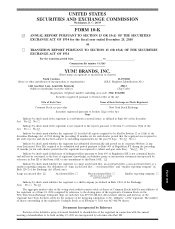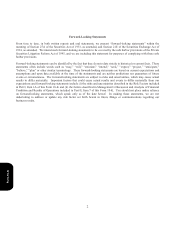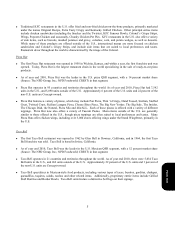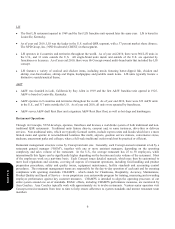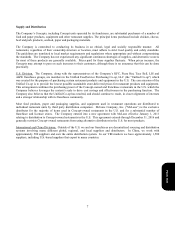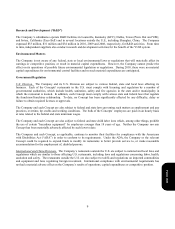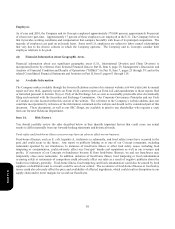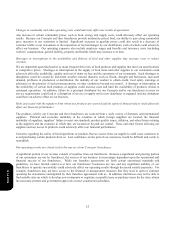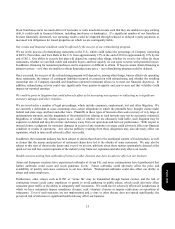Pizza Hut 2010 Annual Report Download - page 101
Download and view the complete annual report
Please find page 101 of the 2010 Pizza Hut annual report below. You can navigate through the pages in the report by either clicking on the pages listed below, or by using the keyword search tool below to find specific information within the annual report.
4
At year end 2010, we had approximately 20,000 system restaurants in the U.S. and recorded revenues of $4.1 billion and
Operating Profit of $668 million during 2010. The International Division, based in Dallas, Texas, comprises
approximately 14,000 system restaurants, primarily KFCs and Pizza Huts, operating in over 110 countries outside the U.S.
In 2010 YRI recorded revenues of $3.1 billion and Operating Profit of $589 million. The China Division, based in
Shanghai, China, comprises approximately 4,000 system restaurants in China, primarily KFCs and Pizza Huts. In 2010,
the China Division recorded revenues of $4.1 billion and Operating Profit of $755 million.
Restaurant Concepts
Most restaurants in each Concept offer consumers the ability to dine in and/or carry out food. In addition, Taco Bell,
KFC, LJS and A&W offer a drive-thru option in many stores. Pizza Hut offers a drive-thru option on a much more
limited basis. Pizza Hut and, on a much more limited basis, KFC offer delivery service.
Each Concept has proprietary menu items and emphasizes the preparation of food with high quality ingredients, as well as
unique recipes and special seasonings to provide appealing, tasty and attractive food at competitive prices.
The franchise program of the Company is designed to assure consistency and quality, and the Company is selective in
granting franchises. Under standard franchise agreements, franchisees supply capital – initially by paying a franchise fee
to YUM, purchasing or leasing the land, building and equipment and purchasing signs, seating, inventories and supplies
and, over the longer term, by reinvesting in the business. Franchisees then contribute to the Company’s revenues through
the payment of royalties based on a percentage of sales.
The Company believes that it is important to maintain strong and open relationships with its franchisees and their
representatives. To this end, the Company invests a significant amount of time working with the franchisee community
and their representative organizations on all aspects of the business, including products, equipment, operational
improvements and standards and management techniques.
The Company and its franchisees also operate multibrand units, primarily in the U.S., where two or more of the Concepts
are operated in a single unit.
Following is a brief description of each concept:
KFC
• KFC was founded in Corbin, Kentucky by Colonel Harland D. Sanders, an early developer of the quick service food
business and a pioneer of the restaurant franchise concept. The Colonel perfected his secret blend of 11 herbs and
spices for Kentucky Fried Chicken in 1939 and signed up his first franchisee in 1952.
• As of year end 2010, KFC was the leader in the U.S. chicken QSR segment among companies featuring chicken-on-
the-bone as their primary product offering, with a 40 percent market share (Source: The NPD Group, Inc.; NPD
Foodworld; CREST) in that segment, which is nearly three times that of its closest national competitor.
• KFC operates in 110 countries and territories throughout the world. As of year end 2010, KFC had 5,055 units in the
U.S., and 11,798 units outside the U.S., including 3,244 units in China. Approximately 15 percent of the U.S. units
and 29 percent of the non-U.S. units are Concept-owned.
Form 10-K


